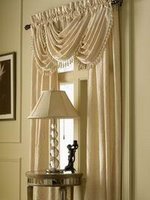Creating A Unique Window Valance

Windows come in all shapes and sizes and sometimes offer a beautiful view. When it is important to let in the most light and not obstruct that perfect view, a window valance can be just the right touch. Window valances come in many different styles and can be used alone or with other window treatments such as drapes, sheers, blinds, or shutters. There are no-sew options as well as the carefully crafted sewn valances that have a real professional touch.
Types of Window Valances
Window valances can be formal or casual. They can be crafted of rich, heavy tapestry fabrics or light, airy cotton. They can be shaped and formed to have a stiff shaped look or be free flowing and informal. The following are some of the more commonly used window valance treatments and how they are made.
Balloon Valance: The balloon valance looks like its name. It normally has a gathered ruffle atop the rod and then the doubled up fabric is pinched in increments so that the areas between the pinches balloon out. Often the puffy areas can be stuffed with tissue paper or even old newspapers if the fabric is thick enough to hide the print. Lighter weight cottons are best for this window treatment. Patterns and stripes, as well as solids, work well to.
The Swag: A swag also looks like it sounds. A swag valance can be short or extend to the floor where it can even be pooled. The swag is held up by two decorative brackets. The width of the fabric is folded accordion style and then draped across the brackets. On wider windows, it may be necessary to support the centre of the swag with a hidden pin or bracket so that it doesn’t swoop too much. Here sheer or very light weight fabrics work well and even some heavier fabrics.
Pleated Valance: A formally shaped valance is best made of heavier fabrics that can be formed and will hold their shape. Lighter weight fabrics may work if they are lined with a stiff enough lining. A pleated or scalloped valance needs to be carefully cut and lined so that when it is pleated and folded the underside fabric shows in equal increments. This style is probably best left to the professional decorator or experienced seamstress. The pleated valance can be hung using a frame made of 2x4” board and L-brackets to that a shelf is created at the top of the window. The fabric can then be stapled to the board once it is shaped, then hung onto the brackets.
How to Make the Most of the Window
Placement of the window valance is almost as important as how it is made and what type of material is used. If windows are short, then the valance can be hung high enough that the bottom just covers the top of the window.
To bring down the height of an extremely tall window the valance can be hung lower or made longer. In general, a valance should not hang more than one-third of the way down the window for the best aesthetics. Two-story windows can be cut in half by the window valance making it a part of the décor of the room on the lower half. By dividing the room’s windows in this manner then the ceiling will not seem so high.
Window valances can be made by anyone with any amount of decorating experience. Some styles require little or no sewing. The important consideration is what type of design is going on in the rest of the room. Remember, window treatments should accent the room and not serve as the focal point.
About The Author
Clinton Maxwell releases for http://www.curtains-drapes-coverings.com, a source on tips and tricks. The publisher is also writing on subjects such as window valance ( http://www.curtains-drapes-coverings.com/window-valance.html )




0 Comments:
Post a Comment
<< Home